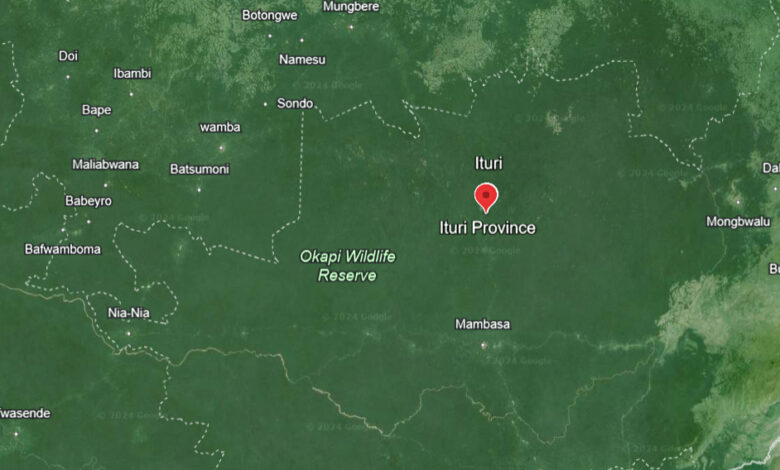Over 1.6 Million People Displaced In Ituri Province As NRC Advocates Lasting Peace In DR Congo
The Democratic Republic of Congo is facing an extreme humanitarian crisis characterised by ongoing conflict, displacement, and widespread suffering.

In 2023, the humanitarian crisis in Ituri Province, one of the 21 new provinces of the Democratic Republic of the Congo, led to the displacement of over 1.6 million people, says the Norwegian Refugee Council (NRC).
Despite this figure, international focus remains fixated on the deteriorating situation in Goma, North Kivu province, overshadowing the escalating conflict in Ituri. Heightened inter-communal violence has further exacerbated tensions, leading to a breakdown in social cohesion and the displacement of hundreds of thousands since February 2024.
Meanwhile, NRC, in a statement by its country director, Eric Batonon, on Thursday, called on the international community to address the crisis in Ituri.
“We cannot afford to overlook the deteriorating conflict in Ituri. The lack of international attention beyond the crisis in North Kivu and the increasing breakdown in relations between local communities across Ituri demand immediate action. We need to be able to deliver more humanitarian aid while also promoting dialogue and reconciliation locally,” part of the statement read.
He added that the frequency of violent attacks in Ituri in the last six months have denied locals the opportunity to cultivate their lands due to fear of attacks or reprisals, exacerbating their struggle to provide for their families.
Many communities are said to be seeking refuge in relatively stable areas, where both displaced individuals and host communities vie for scarce resources such as food, employment, and land, amid insufficient international support.
The First Congo War (1996–1997) erupted following the 1994 Rwandan Genocide, where ethnic Hutu extremists massacred an estimated one million minority ethnic Tutsis and moderate Hutus.
This genocide catalysed the ongoing conflict in the eastern Democratic Republic of Congo (DRC), known as the “African World War,” which has claimed approximately six million lives since 1996, ranking among the deadliest conflicts in history.
Since the Rwandan Genocide, eastern DRC has been embroiled in conflict involving diverse armed factions representing different ethnic and religious groups. The influx of genocidaires and victims into eastern DRC post-genocide has contributed to the region’s instability, with large refugee populations forming and building militias due to a vacuum in governance.
The DRC government’s inability to address governance challenges and simmering ethnic tensions exacerbates the situation, amplifying the influence of non-state actors.
Eastern DRC hosts displaced populations, many of whom have ties to key non-state armed groups like M23, Forces démocratiques de libération du Rwanda, and the Allied Democratic Forces. These groups, bolstered by refugees seeking economic opportunities or driven by ideological fervor, have received support from neighboring governments such as Rwanda, Uganda, and Burundi, acting as proxies in the regional power struggle.
According to a Relief Web report, since the end part of 2023, eastern Congo has been engulfed in escalated conflict, plunging communities into turmoil.
Families are being relentlessly displaced from their homes, leading to economic losses, diminished harvests, and precarious livelihoods.
The conflict between the March 23 Movement (M23) and the Congolese armed forces (FARDC) and their allies in North Kivu has reached alarming proportions, with over 1.7 million people displaced by the M23 crisis alone as of February 13, 2024.
The provincial capital, Goma, has become a refuge for many fleeing the violence in North Kivu, exacerbating pressure on already strained resources.
To address the crises, Batonon emphasised the importance of rebuilding trust and fostering relationships within communities to prevent future conflicts, highlighting the necessity of grassroots efforts for sustainable peace.
He added that enhancing support for conflict transformation and social cohesion initiatives in Ituri will be essential in improving the humanitarian crisis and laying the foundation for lasting peace.
Summary not available.
Support Our Journalism
There are millions of ordinary people affected by conflict in Africa whose stories are missing in the mainstream media. HumAngle is determined to tell those challenging and under-reported stories, hoping that the people impacted by these conflicts will find the safety and security they deserve.
To ensure that we continue to provide public service coverage, we have a small favour to ask you. We want you to be part of our journalistic endeavour by contributing a token to us.
Your donation will further promote a robust, free, and independent media.
Donate HereStay Closer To The Stories That Matter




